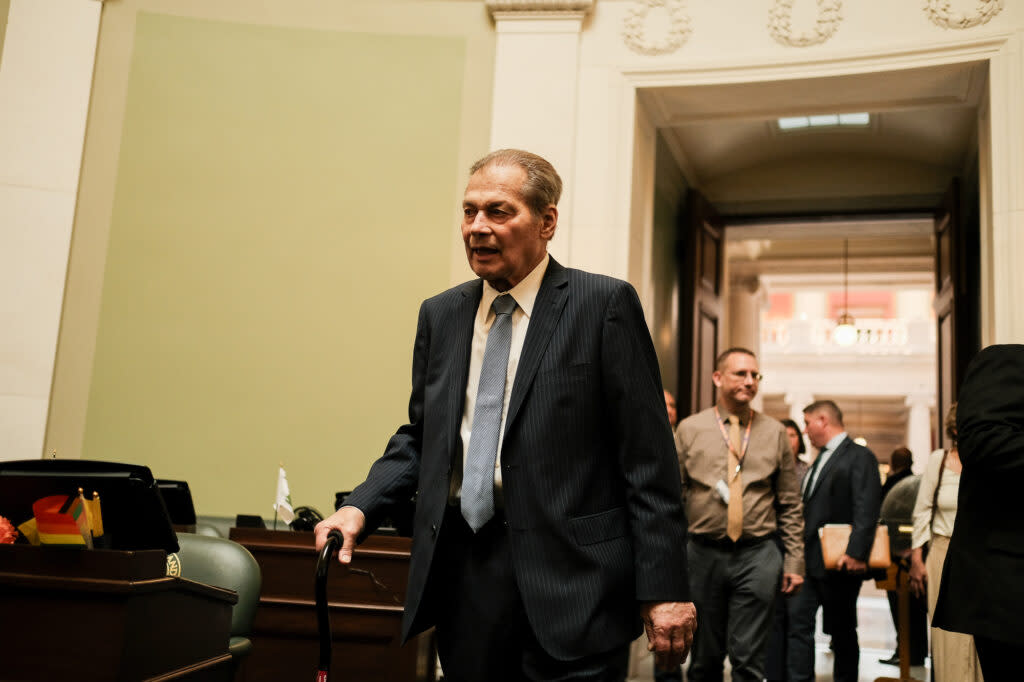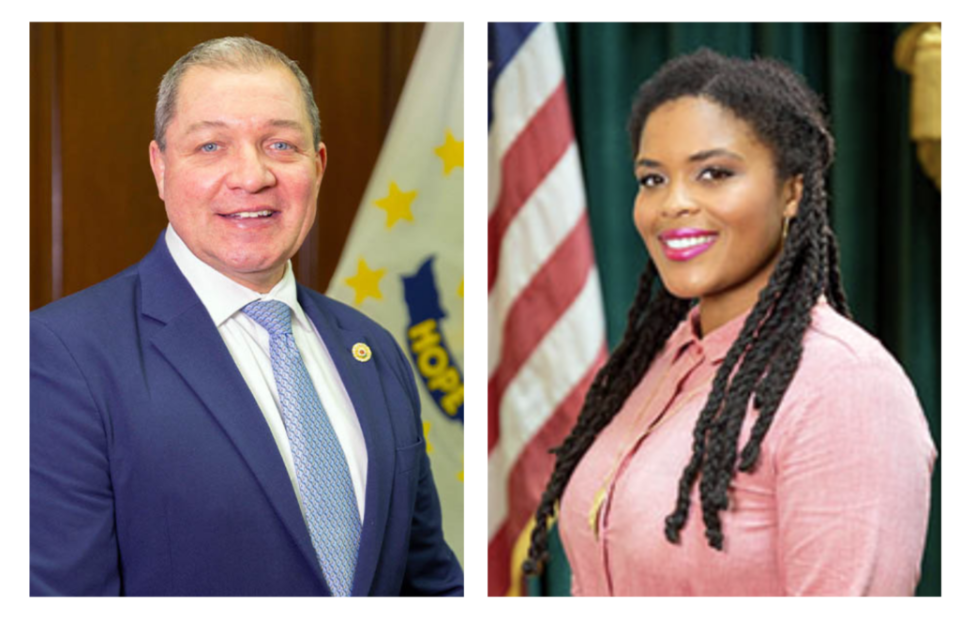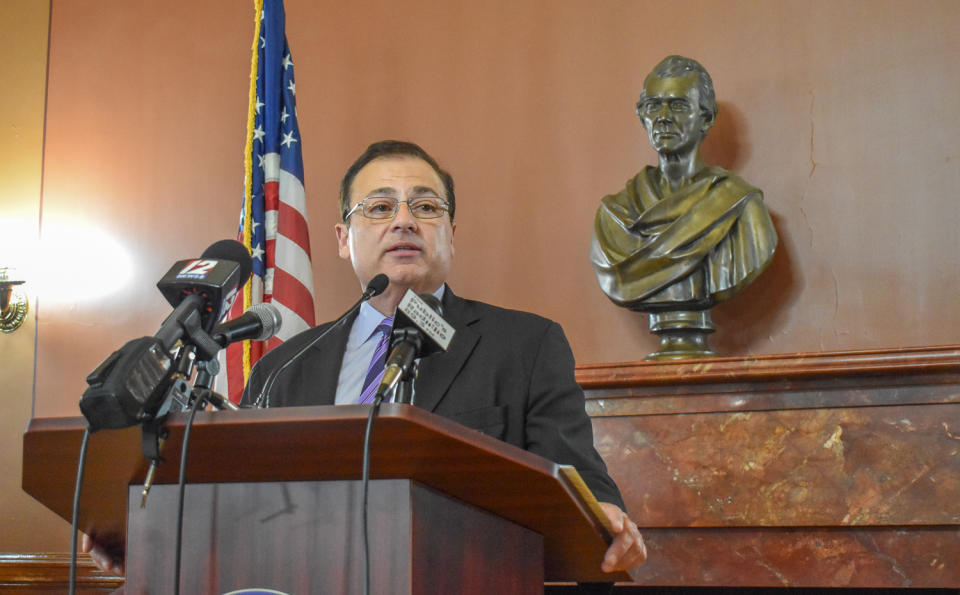Eleven state legislative hopefuls drop out of signature certification deadline

Rhode Island Senate President Dominick Ruggerio, left, a North Providence Democrat, collected the most validated nomination form signatures to support his reelection bid of any state legislative candidate. Ruggerio, who faces a primary challenger, is shown entering the Senate Chamber on the last night of the 2024 legislative session on June 13, 2024. (Will Steinfeld/Rhode Island Current)
Rhode Island House Speaker K. Joseph Shekarchi has an unobstructed path to victory in the November election, after a would-be Republican challenger failed to turn in the required 50 signatures of district voters needed to make the November ballot.
Dana James Traversie, a Warwick Republican whose campaign website describes himself as a hacker with “zero political experience,” had initially signaled his intent to run against Shekarchi but did not appear to gather any signatures, according to the Rhode Island Department of State Elections Division portal. Traversie initially challenged Shekarchi in 2022, losing the general election race by a 20 percentage point margin.
Traversie in an interview Friday morning said he decided not to run in order to devote time and energy to helping Republican challengers in other state legislative races.
“Obviously going up against the Speaker of the House isn’t easy,” Traversie said. “I can put a ton of energy into that race and most likely lose. There are other races, based on my estimation, where I can offer more support and there is a chance.”
Traversie also said he plans to start raising money now in the hopes of mounting a more competitive campaign against Shekarchi in 2026.
Candidates for local, federal, and state office had 10 days in early July to gather signatures of registered voters — the amount depends on the office they are seeking — and turn them in to local boards of canvassers, who in turn reviewed the papers against voter registration files and other documents before submitting a certified, final signature count for each candidate to the state, due by 4 p.m. Thursday. Results were made available online later that night.
It’s not unusual for the signature gathering process to winnow the field, particularly for first-time or lesser known candidates. Indeed, none of the 11 dropouts from state legislative races based on final signature certifications are incumbent lawmakers.
In three cases, including Traversie, the failure to turn in signatures means a sitting legislative incumbent now faces no primary or general election challenger; Sen. Tiara Mack, a Providence Democrat, and Rep. Stephen Casey, a Woonsocket Democrat, initially faced challenges by unaffiliated candidates but those contenders also did not turn in signatures.
In several other races, matchups remain, but the dropouts have eliminated a potential primary, or at least reduced the number of contenders. What was a six-way Democratic primary to replace the open seat vacated by Sen. Josh Miller of Cranston now features five contenders, with Chris Lanen dropping out of the race. Meanwhile, Rep. Enrique Sanchez of Providence now faces only two challengers in the Democratic primary, after a third, Leslie Bunnell, did not turn in any signatures.
Candidates for state and federal office still have until 4 p.m. Friday to withdraw. Objections to state and federal candidates’ nomination papers can also be submitted through 4 p.m. Friday.
Suspicions of signature fraud, which later resulted in two people being criminally charged, clouded the signature gathering and review process during last year’s special Democratic primary for the 1st Congressional District. But this year, review of hundreds of local, state and federal candidate signature papers appears to have avoided the same scandal.
No local boards of canvassers have notified the Rhode Island Board of Elections about suspicious signatures on candidates’ nomination papers, Chris Hunter, a BOE spokesperson, said in an email Friday morning.
The threshold for making the ballot is much lower for state office than for Congress; state representative candidates had to submit at least 50 signatures of registered district voters, while Senate hopefuls had to turn in 100.
That didn’t dampen Senate President Dominick Ruggerio’s quest for collecting — the state Senate leader turned in 275 valid signatures in his reelection bid, the highest of any state legislative candidate.
Contenders for either of Rhode Island’s two seats in the U.S. House of Representatives, meanwhile, had to turn in at least 500 valid signatures. Incumbent Reps. Seth Magaziner and Gabe Amo easily cleared that threshold. Magaziner’s Republican challenger in the 2nd Congressional District, Steven Corvi, met the signature requirement.
Amo will face one Republican challenger, Allen Waters, who previously ran as a Democrat for the seat during the 2023 special primary election, and unaffiliated candidate CD Reynolds. Two other Democrats who signaled their intent to run against Amo, Jeffrey Lemire and Eddy Medrano, fell short of the signature requirement. Unaffiliated contender Ronald Omar Zapanta, withdrew.
U.S. Sen. Sheldon Whitehouse, who turned in more than twice the 1,000 signatures required to make the ballot, will face one Democratic primary opponent: Michael Costa. Meanwhile, Republican Patricia Morgan, who served as a West Warwick state representative for the last four years, will battle Republican Raymond McKay in the primary, based on final, certified signature results. Two independent candidates in the U.S. Senate race, Joseph Lusi and Joel Reyes, did not turn in any signatures.
The Rhode Island Board of Elections is scheduled to pick polling places for the Sept. 5 primary and hear any objections to candidates’ signature papers at a meeting at 2 p.m. Monday. The primary is Sept. 10, with a Nov. 5 general election.
GET THE MORNING HEADLINES DELIVERED TO YOUR INBOX
The post Eleven state legislative hopefuls drop out of signature certification deadline appeared first on Rhode Island Current.



